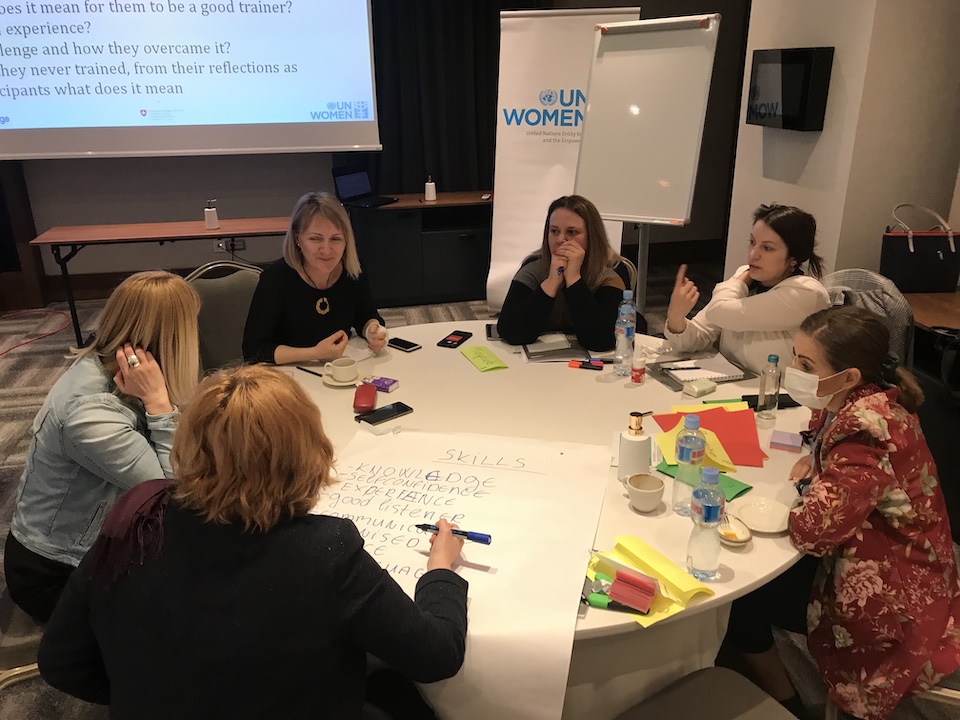Powering up the pool of gender experts
Date:
Experts and practitioners from Western Balkans and Turkey increased their capacities and exchanged good practices on Gender Responsive Budgeting (GRB) while attending a two phased Training of Trainers (ToT). Both ToTs aimed to strengthen the pool of GRB experts in the region by equipping them with advanced knowledge and resources on GRB, as well as innovative adult learning skills.

UN Women Europe and Central Asia Regional Office (ECARO) has positioned GRB as one of the priority areas in which the Office has unique technical expertise grounded in the combined technical skills that have been cultivated with respect to budgetary processes including GRB and the overarching expertise and credibility with respect to Gender Equality and Women s Empowerment (GEWE).
Over the past years, different initiatives have been carried out in Western Balkans with the goal of strengthening democratic governance and advancing women’s rights aiming at mainstreaming gender in policy planning and budgeting. As a result, GRB has been increasingly recognized as an important tool for advancing de facto gender equality, supporting the Sustainable Development Goals (SDGs), the 2030 Agenda, as well as for contributing to the achievements of the Western Balkans’s commitments under the Gender Action Plan in the EU External Relations 2016-2020.
Although UN Women has been investing on GRB for almost a decade still the region has lack of human resources and capacities to respond to the increasing demand from all key actors on GRB including governments.
Two regional Training of Trainers (ToT) were planned and implemented by UN Women ECARO with the purpose of building and strengthening a pool of gender experts equipped with knowledge and resources for conducting adult trainings. Specifically, the trainings focused on increasing the capacities of budget and gender experts and practitioners on how to analyze public policies and budgets from a gender perspective and evaluate if they close, reduce or increase gender inequalities and how they can be made gender responsive.
Namely, the trainings targeted Public Finance Management (PFM) Experts, Gender Equality Experts and Advocates, as well as members of the academia with finance and economic research backgrounds.
Elisabeth Klatzer, one of the trainers and a PFM and GRB Expert, emphasized the importance and the value of the training: “I feel grateful for being part of this experience of building a group of GRB trainers with so many highly knowledgeable and skillful people. They will plant seeds, water them and we will see a flourishing community building a common future equal for all.”
One of the participants, Marija Stankovic stressed the importance of the training with these words; “I work for women’s civil society organizations that are trying to make great change in their communities. Therefore, I believe that the transfer of knowledge regarding GRB will contribute to their initiatives and it will foster the implementation of gender policies.”
Increased knowledge and skills on gender responsive budgeting of the key gender and budget experts and practitioners represents an important foundation that will be used for the facilitation of future learning opportunities in the countries and territories of the Western Balkans and Turkey and broader Europe and Central Asia region.
The first five-day ToT was held online on Zoom platform in July 2021. Team of international experts and UN Women Regional GRB Project Manager delivered presentations and facilitated discussions between 34 participants. Besides plenary presentations, training was conducted through group work via zoom break-out groups, group discussions, case studies, brainstorming and background readings.
The second training which took place on 4-7 April 2022 was organized as a follow-up to the training in July 2021. The content of the training was developed based on the participants' feedback on the specific areas they would like to know more about using adult learning methodologies. With the presentations from PFM and GRB Expert Azra Becirovic, PFM Expert Blerina Xhani, PFM and GRB Expert Elisabeth Klatzer and UN Women ECA GRB Programme Specialist and Regional Manager Ermira Lubani, more then 30 participants have widened their knowledge and skills through simulations and groupwork.
“After the training, I feel much better prepared to link gender perspective with budgeting and to support the increase of the capacities of public officials at central and local level on GRB tools and methodologies. I will surely recommend this training to all my colleagues," said Nadia Rusi who is a professor at the Law University in Tirana and is working as a GRB expert supporting the Supreme Audit Institution (SAI), Albanian School of Public Administration (ASPA) and the Parliament of Albania.
Trainings were delivered under the regional programme “Transformative Financing for Gender Equality towards more Transparent, Inclusive and Accountable Governance in the Western Balkans (2020 – 2024)”. The regional programme is implemented by UN Women Regional Office for Europe and Central Asia and is financed by the Swiss Agency for Development and Cooperation and the Swedish International Development Cooperation Agency – Sida.